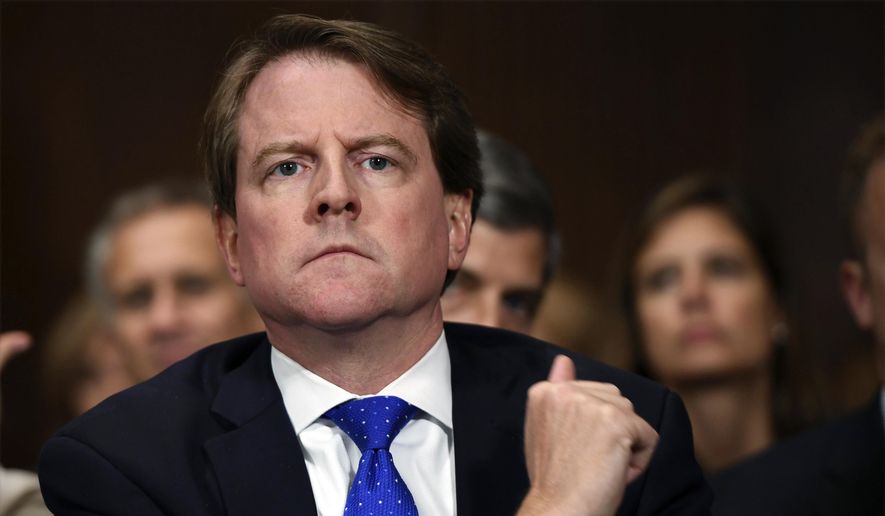House Democrats and the Trump administration are squaring off in federal court over the impeachment probe, testing the bounds of congressional oversight and executive privilege in a pair of cases that could reshape the balance of power between each end of Pennsylvania Avenue.
In the first round, panels of mostly Republican-appointed judges last week expressed skepticism of arguments made by President Trump’s Justice Department that the courts should stay on the sidelines because the House already impeached the president.
The House Judiciary Committee filed the two lawsuits to compel testimony from former White House counsel Don McGahn and to gain access to secret grand jury material from former special counsel Robert Mueller’s Russian collusion probe.
Losses for the Trump administration in the cases could limit his effort to keep his current and former advisers from talking to Democrats as they mull more articles of impeachment.
The two sides faced off in back-to-back hearings before the D.C. Circuit Court of Appeals.
Each three-judge panel was comprised of two judges appointed by Republican presidents, including Mr. Trump. However, that did not seem to help the Justice Department lawyers who were peppered with aggressive questions.
In the first case, Justice Department attorney Hashim Moopan urged the appellate court to stay out of the impeachment fight, asking it to stay on the sidelines in the McGahn dispute.
He said the court should not insert itself into the dispute between the executive and legislative branches.
“This court should not be referring whether the president is acting totally unusual or Congress is acting totally unusual,” he told the three-judge panel.
Mr. Moopan said if the courts weigh in on whether Mr. McGahn should testify, it risks politicizing itself and “undermining the public confidence.”
The House Judiciary Committee last year subpoenaed Mr. McGahn, saying it wanted to hear about Mr. Trump’s attempt to fire Mr. Mueller. Committee Democrats say the attempted removal of Mr. Mueller could amount to obstruction of justice, necessitating additional articles of impeachment.
Mr. Trump pressured Mr. McGahn to fire the special counsel over alleged “conflicts of interest,” according to the Mueller report. Mr. McGhan refused to lower the ax and nearly resigned in protest.
Mr. McGahn left the administration in 2018, more than a year after he was pushed to fire the special counsel.
The administration has ordered current and former officials not to comply with congressional subpoenas for testimony and documents. Mr. McGahn has complied, bucking the subpoena.
The judges, Republican appointee Thomas Griffith and Democrat appointee Judith Rogers, peppered Mr. Moopan with questions about why the courts should be sidelined.
Mr. Moopan said Democrats could pass a statute to enforce the subpoena as part of the “give and take in the political process.”
“It takes two,” said Judge Rogers, drawing laughter from the courtroom. “We’re at the point now where there is no cooperation.”
Megan Barbero, an attorney for the Judiciary Committee Democrats, said the court must rule because staying out of the fight would give the executive branch too much power.
Ms. Barbero also said the committee needs Mr. McGahn’s testimony for additional investigations into Mr. Trump. She said Congress has remained in the fight for the McGahn testimony “because of impeachment.”
Democrats have repeatedly said the bid to fire Mr. Mueller amounted to obstruction of justice.
“If this material reveals new evidence supporting the conclusion that President Trump committed impeachable offenses that are not covered by the articles adopted by the House, the committee will proceed accordingly — including, if necessary, by considering whether to recommend new articles of impeachment,” Ms. Barbero said.
Judge Griffith questioned why Congress needed to hear from Mr. McGahn, as impeachment is about the president’s dealings with Ukraine and did not arise from the Mueller investigation.
“McGhan was long gone by then,” Judge Griffith said of Mr. Trump’s controversial July 25 phone call with the Ukrainian president that is at the center of the impeachment fight.
Although one of the two articles of impeachment passed by the House last month was for obstruction of Congress, Mr. Trump has not been impeached on obstruction of justice charges.
Historically, the federal courts try to stay away from disputes between Congress and the executive branch. And the Justice Department said it would be inappropriate for the court to weigh in on the case because of the impeachment saga.
In November, a federal judge on a different court ordered Mr. McGahn to testify, declaring in a 118-page opinion that “presidents are not kings” and “no one is above the law.”
The doubleheader restarted Friday as two of the judges from the McGahn case, with a new judge, heard arguments over House Democrats’ bid to obtain Mr. Mueller’s grand jury materials.
The new judge was Neomi Rao, who is a Trump appointee. She replaced Karen LeCraft Henderson, an appointee of President George W. Bush.
House lawyer Douglas Letter emphasized the need for the court to decide the dispute because it avoids further conflict between co-equal branches of government.
Mr. Letter said, absent a court decision, the fight over Mueller grand jury material could turn into a “gunbattle” between the House sergeant-at-arms and Attorney General William Barr.
Judge Rao argued the court has never released grand jury material to Congress. But Mr. Letter responded the committee has a history of protecting grand jury information. He said the committee has yet to publicly release the Watergate road map, which was the grand jury material turned over to Congress during the Nixon administration.
Mark Freeman, a Justice Department lawyer, said Democrats need to meet a higher threshold to demonstrate a need for the materials.
“It does not follow that what they say they need, they get,” he told the court.
Based on questions posed by the judges, the court might consider sending that case back to a lower court for more analysis specifying the exact material sought by lawmakers and their reasons for wanting it.
• Jeff Mordock can be reached at jmordock@washingtontimes.com.




Please read our comment policy before commenting.